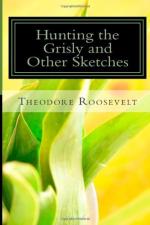CHAPTER IX.—IN COWBOY LAND.
Out on the frontier, and generally among those who spend their lives in, or on the borders of, the wilderness, life is reduced to its elemental conditions. The passions and emotions of these grim hunters of the mountains, and wild rough-riders of the plains, are simpler and stranger than those of people dwelling in more complicated states of society. As soon as the communities become settled and begin to grow with any rapidity, the American instinct for law asserts itself; but in the earlier stages each individual is obliged to be a law to himself and to guard his rights with a strong hand. Of course the transition periods are full of incongruities. Men have not yet adjusted their relations to morality and law with any niceness. They hold strongly by certain rude virtues, and on the other hand they quite fail to recognize even as shortcomings not a few traits that obtain scant mercy in older communities. Many of the desperadoes, the man-killers, and road-agents have good sides to their characters. Often they are people, who, in certain stages of civilization, do, or have done, good work, but who, when these stages have passed, find themselves surrounded by conditions which accentuate their worst qualities, and make their best qualities useless. The average desperado, for instance, has, after all, much the same standard of morals that the Norman nobles had in the days of the battle of Hastings, and, ethically and morally, he is decidedly in advance of the vikings, who were the ancestors of these same nobles—and to whom, by the way, he himself could doubtless trace a portion of his blood. If the transition from the wild lawlessness of life in the wilderness or on the border to a higher civilization were stretched out over a term of centuries, he and his descendants would doubtless accommodate themselves by degrees to the changing circumstances. But unfortunately in the far West the transition takes place with marvellous abruptness, and at an altogether unheard-of speed, and many a man’s nature is unable to change with sufficient rapidity to allow him to harmonize with his environment. In consequence, unless he leaves for still wilder lands, he ends by getting hung instead of founding a family which would revere his name as that of a very capable, although not in all respects a conventionally moral, ancestor.
Most of the men with whom I was intimately thrown during my life on the frontier and in the wilderness were good fellows, hard-working, brave, resolute, and truthful. At times, of course, they were forced of necessity to do deeds which would seem startling to dwellers in cities and in old settled places; and though they waged a very stern and relentless warfare upon evil-doers whose misdeeds had immediate and tangible bad results, they showed a wide toleration of all save the most extreme classes of wrong, and were not given to inquiring too curiously into a strong man’s




